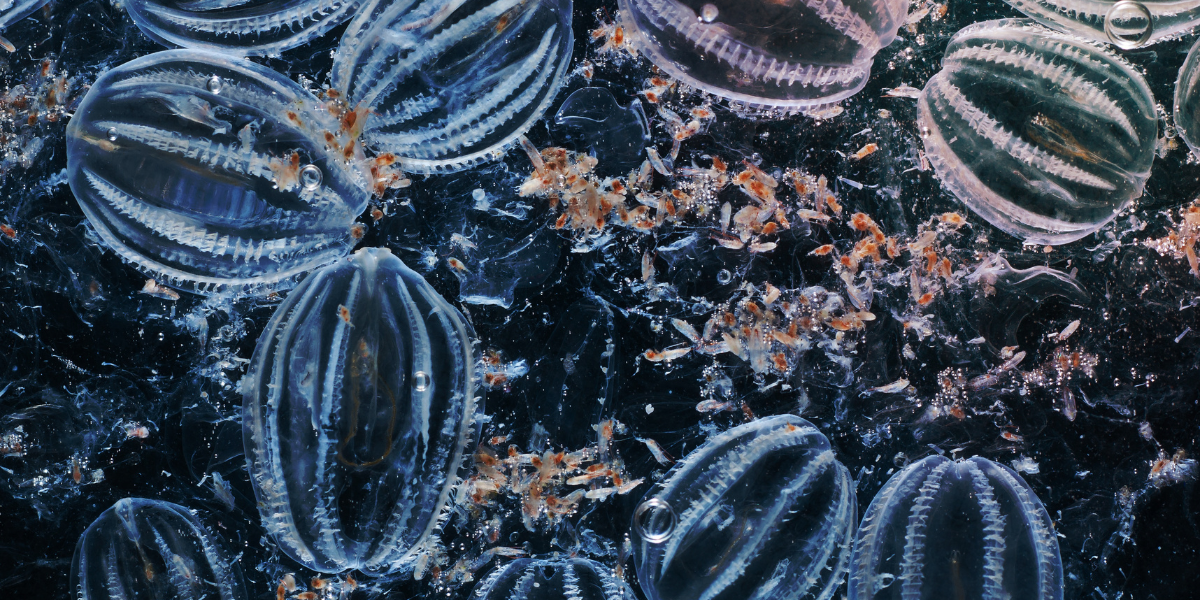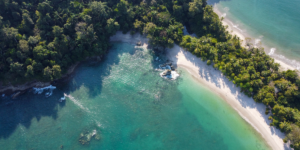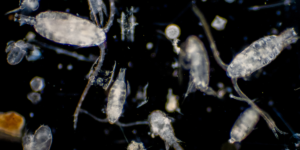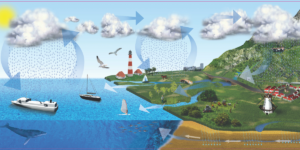Zooplankton’s Impact on Ocean Health: A Critical Ecological Keystone
You stand at the edge of the ocean, gazing out at the endless expanse of blue. The waves lap gently against your feet, and the salty breeze carries with it a sense of peace and tranquility.
But beneath the surface lies a complex network of life that is essential to our planet’s health – including zooplankton.
Zooplankton may be small, but they play an enormous role in maintaining healthy ocean ecosystems. As tiny animals that drift along with the currents, they serve as the foundation for the ocean’s food web and help to regulate carbon dioxide levels in our atmosphere.
Without them, entire ecosystems could collapse – which is why it is crucial to understand their importance and take action to protect them from threats such as pollution and climate change.
So let’s dive deeper into what makes these tiny creatures so vital to our planet’s health.
Key Takeaways
- Zooplankton serve as a vital food source for many marine animals and play a fundamental role in maintaining healthy ocean ecosystems.
- Zooplankton populations are diverse and adapt to changing environmental conditions, supporting a broad range of marine life at different depths and latitudes.
- Overfishing and pollution, particularly plastic pollution, pose significant threats to zooplankton populations and the delicate web of life in our oceans.
- Conservation efforts, including reducing the use of harmful chemicals and plastics, promoting sustainable fishing practices, and creating marine protected areas, are crucial in protecting zooplankton and maintaining healthy ocean ecosystems.
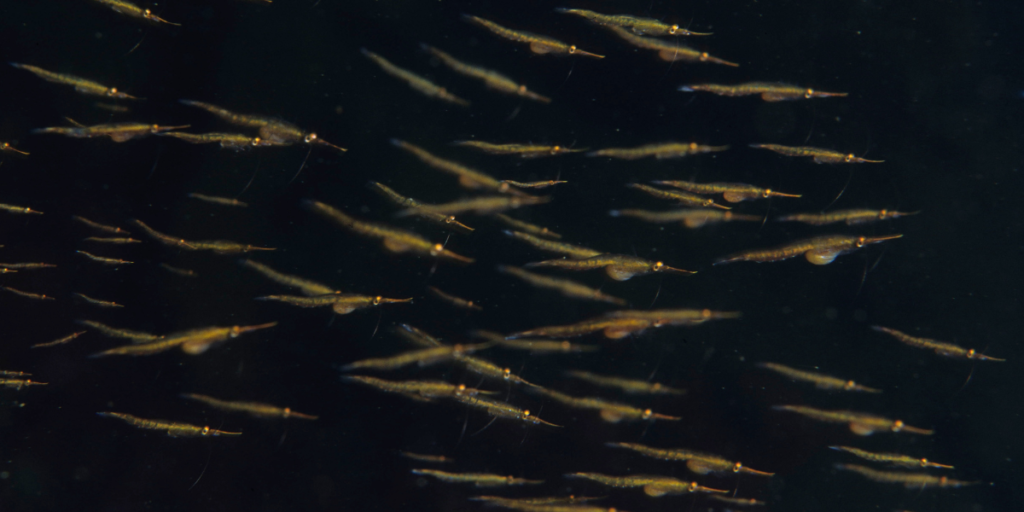
The Importance of Zooplankton in the Ocean Ecosystem
Without zooplankton, the ocean ecosystem would crumble and our world wouldn’t be the same. Zooplankton are essential to maintaining a healthy ocean ecosystem. They act as a bridge between primary producers and higher trophic levels, serving as a food source for many marine animals, including fish, whales, and seabirds.
Research on zooplankton biodiversity is crucial for understanding their role in the ocean ecosystem. There are over 8,000 species of zooplankton in the ocean, each with its unique characteristics and importance to the food web. By studying these organisms’ behavior and interactions with other species in their environment, scientists can gain insight into how changes in zooplankton populations can affect entire ecosystems.
Understanding these relationships is essential for predicting future changes due to climate change or human activities such as overfishing or pollution.
Zooplankton as the Foundation of the Ocean’s Food Web
You rely on zooplankton to serve as the starting point for the ocean’s food web, providing sustenance for larger marine creatures and ultimately ensuring a thriving ecosystem. As small, drifting organisms that are found throughout the world’s oceans, zooplankton play a fundamental role in maintaining healthy ocean ecosystems. Without them, marine life as we know it wouldn’t exist.
Zooplankton come in many shapes and sizes and exhibit an incredible diversity of behaviors and migration patterns. Some species of zooplankton migrate vertically within the water column each day, moving up to feed at night on phytoplankton near the surface before returning to deeper waters during the day. Others undertake seasonal migrations covering thousands of kilometers as they follow currents or search for food sources.
These complex movements allow zooplankton populations to adapt to changing environmental conditions and help support a broad range of marine life at different depths and latitudes.
Zooplankton’s Role in Regulating Carbon Dioxide
Zooplankton play an important part in regulating the amount of carbon dioxide in the ocean. They consume phytoplankton and respire carbon dioxide back into the water. However, they also excrete fecal pellets made up of undigested organic matter that sink to deeper waters and become a source of food for decomposing bacteria. This process removes carbon from surface waters and stores it in deeper layers of the ocean.
The role of zooplankton in regulating carbon dioxide is increasingly important as oceans absorb more greenhouse gases from human activities. These gases cause ocean acidification, which can harm marine life and disrupt entire ecosystems. Zooplankton help mitigate this impact by consuming phytoplankton and removing excess carbon from surface waters.
Overall, zooplankton’s respiratory system plays a crucial role in maintaining healthy ocean ecosystems by regulating carbon dioxide levels and preventing further acidification of our seas.
Threats to Zooplankton Populations
If we’re not careful, threats to the population of zooplankton could have devastating effects on the delicate balance of our oceans.
For instance, overfishing can lead to a decrease in zooplankton populations as they’re an important food source for many fish species.
This can have a domino effect on the entire ecosystem as it disrupts the food chain and affects other organisms that depend on those fish for their survival.
Pollution also has a significant impact on zooplankton populations.
Chemical pollutants such as oil spills or agricultural runoff can harm or kill these tiny creatures directly.
Additionally, plastic pollution poses a threat as small microplastics can be mistaken for food by zooplankton which then accumulate in their bodies and cause health problems.
The loss of zooplankton would not only affect marine life but could also impact humans who rely on seafood for their livelihood and nutrition.
It’s vital that we take measures to protect these essential organisms and maintain healthy ocean ecosystems.

The Need for Conservation and Awareness
Conservation and awareness are crucial in preserving the delicate web of life in our oceans, ensuring a vibrant world for generations to come.
Zooplankton populations play an important role in maintaining healthy ocean ecosystems, but they’re threatened by human activities such as overfishing, pollution, and climate change.
It’s essential that we take action to protect these small creatures and the larger ecosystem they support.
Conservation efforts can include reducing the use of harmful chemicals and plastics, promoting sustainable fishing practices, and creating marine protected areas.
Public education is also key in raising awareness about the importance of zooplankton and their role in ocean health.
By working together to protect these tiny organisms, we can help maintain a healthy ocean ecosystem that benefits both marine life and humans alike.
Frequently Asked Questions
What are the different types of zooplankton and how do they differ in their role in the ocean ecosystem?
To understand the role of zooplankton in ocean ecosystems, it’s important to consider their diversity and trophic interactions. Different types of zooplankton play unique roles, such as grazing on phytoplankton or serving as prey for larger animals.
How do changes in ocean temperature and acidity affect zooplankton populations and the overall health of the ocean ecosystem?
As climate change warms and acidifies oceans, zooplankton populations decline, reducing biodiversity. Imagine a vast orchestra losing its percussion section – it would lose rhythm and harmony. Zooplankton are vital for ocean health.
What are some of the lesser-known benefits of zooplankton to humans and other species?
Did you know that zooplankton provide important nutrients to other marine species, including humans? They also have potential for medical applications due to compounds found in them. Further research could reveal more benefits of these tiny creatures.
How do human activities, such as overfishing and pollution, impact zooplankton populations and the wider ecosystem?
Overfishing and pollution have significant impacts on zooplankton populations, which can disrupt the wider ocean ecosystem. Conservation efforts are crucial in protecting zooplankton biodiversity and maintaining a healthy balance in the marine environment.
Are there any current or proposed conservation efforts specifically targeting zooplankton populations?
You may be interested to know that there are ongoing efforts to conserve zooplankton populations. These include initiatives for monitoring their populations and protecting their habitats. Such actions are crucial in maintaining a healthy ocean ecosystem.
Conclusion
Congratulations! You’ve just learned about the crucial role of zooplankton in maintaining healthy ocean ecosystems. These tiny creatures are essential for ocean life, serving as the foundation of the food web and regulating carbon dioxide levels.
However, it’s ironic that despite their importance, zooplankton populations are threatened by human activities such as overfishing, pollution, and climate change. If we continue with our destructive ways, we risk losing these vital organisms and disrupting the delicate balance of the ocean ecosystem.
Therefore, it’s imperative that we take action now to conserve and protect our oceans and its inhabitants. By raising awareness about the importance of zooplankton and reducing our impact on the planet, we can ensure a healthy future for ourselves and all marine life.
Remember, every small step counts towards making a big difference in preserving our precious oceans.

